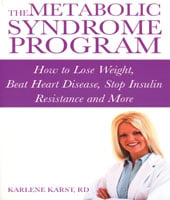Advertisement
The Metabolic Syndrome Program
by Karlene KarstWiley & Sons, 2006287 pages Most of us don’t yet know much about metabolic syndrome (MSX), but in the few short minutes it will take to read this page, we may realize that someone we know could be suffering from this group of conditions. Thanks go to author-nutritionist Karlene Karst for bringing this … Continued

by Karlene Karst
Wiley & Sons, 2006
287 pages
Most of us don’t yet know much about metabolic syndrome (MSX), but in the few short minutes it will take to read this page, we may realize that someone we know could be suffering from this group of conditions.
Thanks go to author-nutritionist Karlene Karst for bringing this complex set of symptoms to light. Hers is one of the first books that not only takes an in-depth look at the subject, but also outlines a realistic treatment plan.
Metabolic syndrome (MSX), sometimes called insulin resistance syndrome, is associated with obesity, and occurs when cells no longer respond well to insulin, and the body attempts to compensate by secreting an overabundance of insulin into the bloodstream. Also, there is some suggestion that hereditary factors determine the body’s reaction to insulin. Karst’s book predicts the syndrome will be experienced by upwards of 25 percent of the adult US population in the near future.
Primary risk factors for MSX include abdominal obesity, blood fat disorders, and high blood pressure. Doesn’t this start to sound familiar: the big belly, high body mass index, high blood pressure? Other associated factors include physical inactivity, aging, hormonal imbalance, and genetic predisposition. Medical experts consider MSX to be the number- one risk factor for heart disease.
Karst begins her book with a risk assessment quiz followed by a closer look at all the associated risk factors. She identifies a critically important and invisible body-wide inflammation triggered by fat cells, which she considers to be the smoking gun of MSX. Making dietary changes that include avoiding those pro-inflammatory foods on Karst’s list can target the obesity component. The author includes recommendations for gently increasing activity, and a discussion of helpful natural health supplements, eating tips, and recipes. Karst also recommends increasing dairy consumption which, according to studies, has proven to curb MSX.
Metabolic syndrome is a new subject for most of us, and it may sound complicated at first. Karst, however, has a welcome straightforward style, and she ensures we’re on track to understanding the condition by using short sections to recap each chapter. I welcome the addition of The Metabolic Sydrome Program to my health library and know that others will benefit from learning more about MSX.




